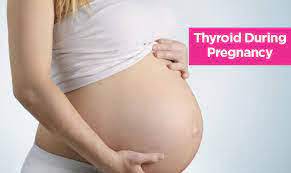 Anything unusual during pregnancy cannot be left untreated, and one such matter that deserves to be attended to is thyroid during pregnancy. You must have come across females saying that my thyroid levels have increased during pregnancy, and the doctor has advised me additional medicines. What does this generally mean? How can a butterfly-shaped gland in the neck affect your pregnancy and in some cases, even fertility?
Anything unusual during pregnancy cannot be left untreated, and one such matter that deserves to be attended to is thyroid during pregnancy. You must have come across females saying that my thyroid levels have increased during pregnancy, and the doctor has advised me additional medicines. What does this generally mean? How can a butterfly-shaped gland in the neck affect your pregnancy and in some cases, even fertility?
What is Thyroid?
The thyroid gland in your neck secretes thyroid hormones, which control the way your body uses energy, and thus it controls every organ of the body. At times either very high or very low hormones are secreted which is called hyperthyroidism and hypothyroidism, respectively.
Getting diagnosed with thyroid during pregnancy demands you to be careful and follow the medications prescribed by the doctor. Thyroid hormones ensure the healthy development of the brain and nervous system of the fetus. Thus it is important that these functions well.
Thyroid problems during pregnancy can either be related to hyperthyroidism or hypothyroidism, and understanding the two separately is important.
Symptoms of Hyperthyroidism in Pregnancy
- Shaky hands
- Tiredness
- Unusual heartbeat
- If you are unable to attain normal pregnancy weight
- Nausea
- Unexplained nervousness
Symptoms of Hypothyroidism in Pregnancy
- Constipation
- Sensitivity to cold temperature
- Cramps
- Difficulty in concentration and retention
Reasons behind the thyroid problem in pregnancy
Hyperthyroid: Thyroid level in pregnancy will increase in case the mother is diagnosed with Grave’s disease in which Thyroid Stimulating Immunolglobin is made by the body which makes too much thyroid hormone.
Hypothyroid: Hashimoto’s thyroiditis is the reason behind hypothyroid during pregnancy. In this, the thyroid is attacked by the anti-body which doesn’t leave it with sufficient cells to produce thyroid hormone, thus lowering the levels.
How can thyroid during pregnancy affect the baby?
Hyperthyroidism during pregnancy can lead to:
- Low birth weight
- Miscarriage
- Preeclampsia
- Premature birth
- Congestive heart failure
Untreated hypothyroidism during pregnancy can result in:
- Miscarriage
- Anemia
- Preeclampsia
- Congestive heart failure in some cases
- Stillbirth
- Low birth weight
Thyroid in Pregnancy is unhealthy for you and your baby. Thus you must have a healthy and balanced diet that includes iodine because the thyroid hormone is made by thyroid through iodine. About 250 microgram of iodine is essential every day and rich sources are:
- Iodized Salt
- Seafood
- Eggs
- Meat
- Poultry
- Dairy Products
Your doctor might suggest you prenatal vitamins with 150 micrograms of iodine so that iodine levels remain regulated.
In some cases, thyroid and infertility are related to each other, and it happens in the case of hypothyroidism when the lower levels of thyroid hormone interfere with ovulation and result in infertility.
Estrogen and HCG (Human Chorionic Gonadotropin) might make thyroid levels increase during pregnancy. Thus, your doctor will monitor these levels and then begin with the medications to ensure that you have a healthy pregnancy and delivery.



